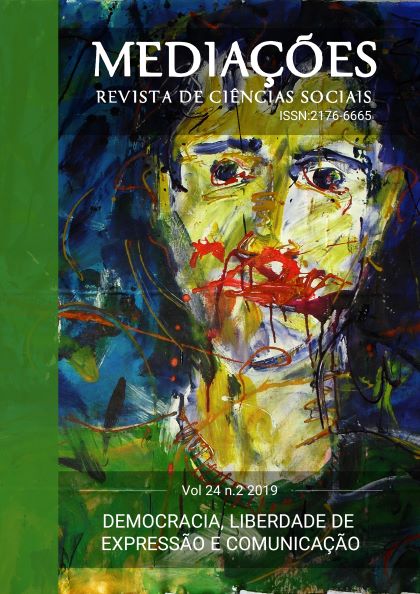Dossier presentation: Democracy, freedom of speech and communication
DOI:
https://doi.org/10.5433/2176-6665.2019v24n2p9Keywords:
Freedom of expression, Democracy, Mass mediaAbstract
Established, either in the theoretical field or in constitutional practice, as a founding principle of democratic order, freedom of expression was and has been scrutinized by diverse areas of knowledge. In this paper we explore the main debates involving free expression of ideas fundamentals, seeking to highlight their relationship and conflict with other values, such as equality, tolerance and justice. In a problem-oriented approach, we shed light on the issues of hate speech and pornography, and, as well, on the implications, to public deliberation, of the unequal access to mass media and the new technology of information. At the end, we present the papers that make up this dossier. We expect, in this sense, to contribute to the constitution of a research agenda about freedom of expression, an urgent task in the current scenario in which this fundamental right has been under attack by governments of different ideological orientations.Downloads
References
BARROSO, Júlio. Liberdade de expressão, pornografia e igualdade de gênero. Revista de Estudos Feministas, Florianópolis, v. 21, n. 1, p. 143-165, abr. 2013.
BIROLI, Flávia. Limites da política e esvaziamento dos conflitos: o jornalismo como gestor de consensos. Revista Estudos Políticos, Niterói, v. 1, n. 6, p. 126-143, 2013.
BRASIL. BRASIL. [Constituição (1988)]. Constituição da República Federativa do Brasil de 1988. Brasília, DF: Presidência da República, [2016].
BRUGGER, Winfried. Proibição ou proteção do discurso do ódio? algumas observações sobre o direito alemão e o americano. Revista de Direito Público, Brasília, DF, n. 15, p. 117-136, jan./mar. 2007.
DAHL, Robert. Poliarquia. São Paulo: Edusp, 1997.
DIAMOND, Larry. Para entender a democracia. Curitiba: Atuação, 2017.
DWORKIN, Andrea. Pornography: men possessing women. Nova York: E. P. Dutton, 1989.
DWORKIN, Ronald. O direito da liberdade. São Paulo: WMF Martins Fontes, 2006.
DWORKIN, Ronald. Women and pornography. New York Review of Books, New York, v. 21, out. 1993.
FLETCHER, George. "The instability of tolerance". In: HEYED, David (org.). Toleration: an elusive virtue. Princeton: Princeton University Press, 1996. p. 158-172.
FRANCISQUINI, Renato. Democracia, liberdade de expressão e o valor equitativo das liberdades comunicativas. 2014. Tese (Doutorado) - Universidade de São Paulo, São Paulo, 2014.
FREEDOM and the media 2019: a downward spiral. Freedom House, Washington, DC, jun. 2019. Disponível em: https://freedomhouse.org/sites/default/files/FINAL07162019_Freedom_And_The_Media_2019_Report.pdf. Acesso em: ago. 2019.
GATES JUNIOR, Henry Louis. “Let them talk: why civil liberties pose no threat to civil rights”, The New Republic, [S.l.], 20 set. 1993.
GATES JUNIOR, Henry Louis; GRIFFIN, Anthony P.; LIVELY, Donald P.; POST, Robert C.; RUBENSTEIN, William; STROSSEN, Nadine. Speaking of race, speaking of sex: hate speech, civil rights and civil liberties. New York: University Press, 1994.
GROSS, Clarissa Piterman. Poder dizer ou não?: discurso de ódio, liberdade de expressão e a democracia liberal igualitária. 2017. Tese (Doutorado) - Universidade de São Paulo, São Paulo, 2017.
JUSTIA US LAW. Collin v. Smith. 578 F.2d 1197. EUA, 1978. Disponível em: http://www.law.umkc.edu/faculty/projects/ftrials/conlaw/colinvsmith.html. Acesso em: 1 jul. 2019.
KONVITZ, Milton. Fundamental liberties of a free people: religion, speech, press, assembly. Livingston (NJ): Transaction Publishers, 2003.
LEGAL INFORMATION INSTITUTE . Beauharnais v. Illinois, 343 U.S. 252, 1952. Disponível em: https://www.law.cornell.edu/supremecourt/text/343/250. Acesso em: 1 jul. 2019.
MACKINNON, Catharine A. Only words. Cambridge: Harvard University Press, 1993.
MACKINNON, Catharine. Feminism unmodified: discourses on life and law. Cambridge, Harvard University Press, 1987.
MAQUIAVEL, Nicolau. Comentários sobre a primeira década de tito lívio. Brasília: Editora Universidade de Brasília, 2000.
MATSUDA, Mari J. "Public response to racist speech: considering the victim's story", In: MATSUDA, Mari J.; LAWRENCE III, Charles R; DELGADO, Richard; CRENSHAW, Kimberle Williams. Words that wound: critical race theory, assaultive speech, and the first amendment. New York: Westview Press, 1993b. cap. 2.
MATSUDA, Mari. J.; LAWRENCE III, Charles R; DELGADO, Richard; CRENSHAW, Kimberle Williams. Words that wound: critical race theory, assaultive speech, and the first amendment. New York: Westview Press, 1993a.
MEIKLEJOHN, Alexander. Free speech and its relation to self-government. New York: Harper Brothers Publishersh, 1948.
MILTON, John. Aeropagítica: discurso pela liberdade de imprensa ao parlamento da inglaterra. Rio de Janeiro: Topbooks, 1999.
POST, Robert C. Meiklejohn’s Mistake: Individual Autonomy and the Reform of Public Discourse. University of Colorado Law Review, vol. 64, 1993, p. 1109-1137.
RAWLS, John. O Liberalismo político. Tradução Luís Carlos Borges. São Paulo: Editora WMF Martins Fontes, 2011.
SCANLON, Thomas M. “The Difficulty of Tolerance”. In: SCANLON, Thomas M. The difficulty of tolerance: essays in political philosophy. New York: Cambridge University Press, 2003. p. 187-201.
SNITOW, Ann. “Retrenchemant vs. Transformation: the politics of the antipornography movement”. In: JAKER, Beth; HUNTER, Nan; O'DAIR; ELLIS, Kate. Caught looking: feminism, pornography & censorship. 3. ed. East Heaven: Longriver Books, 1992.
WALDRON, Jeremy. The harm in hate speech. Cambridge: Harvard University Press, 2012.
Downloads
Published
How to Cite
Issue
Section
License
Copyright (c) 2022 Júlio César Casarin Barroso Silva, Renato Francisquini Teixeira

This work is licensed under a Creative Commons Attribution 4.0 International License.
Copyright on articles published in Mediações belongs to the author(s): in the case of partial or entire republication of the original publication, we ask author(s) to indicate the original publication in the periodical.
Mediações uses the Creative Commons Attribution 4.0 International license, which allows Open Access, enabling any user to read, download, copy and disseminate its content so long as adequately referenced.
The opinions expressed by the author(s) are their sole responsibility.
































